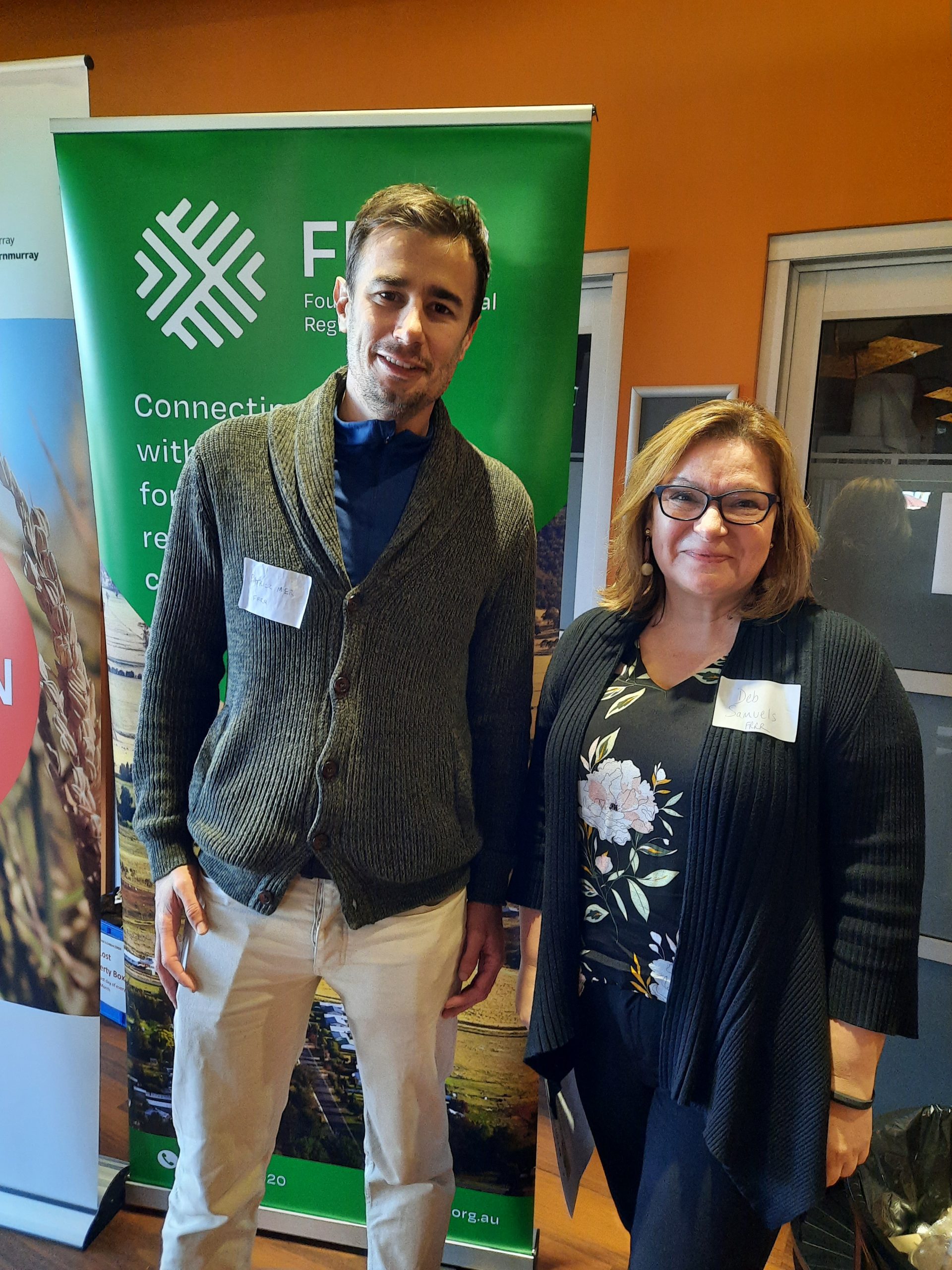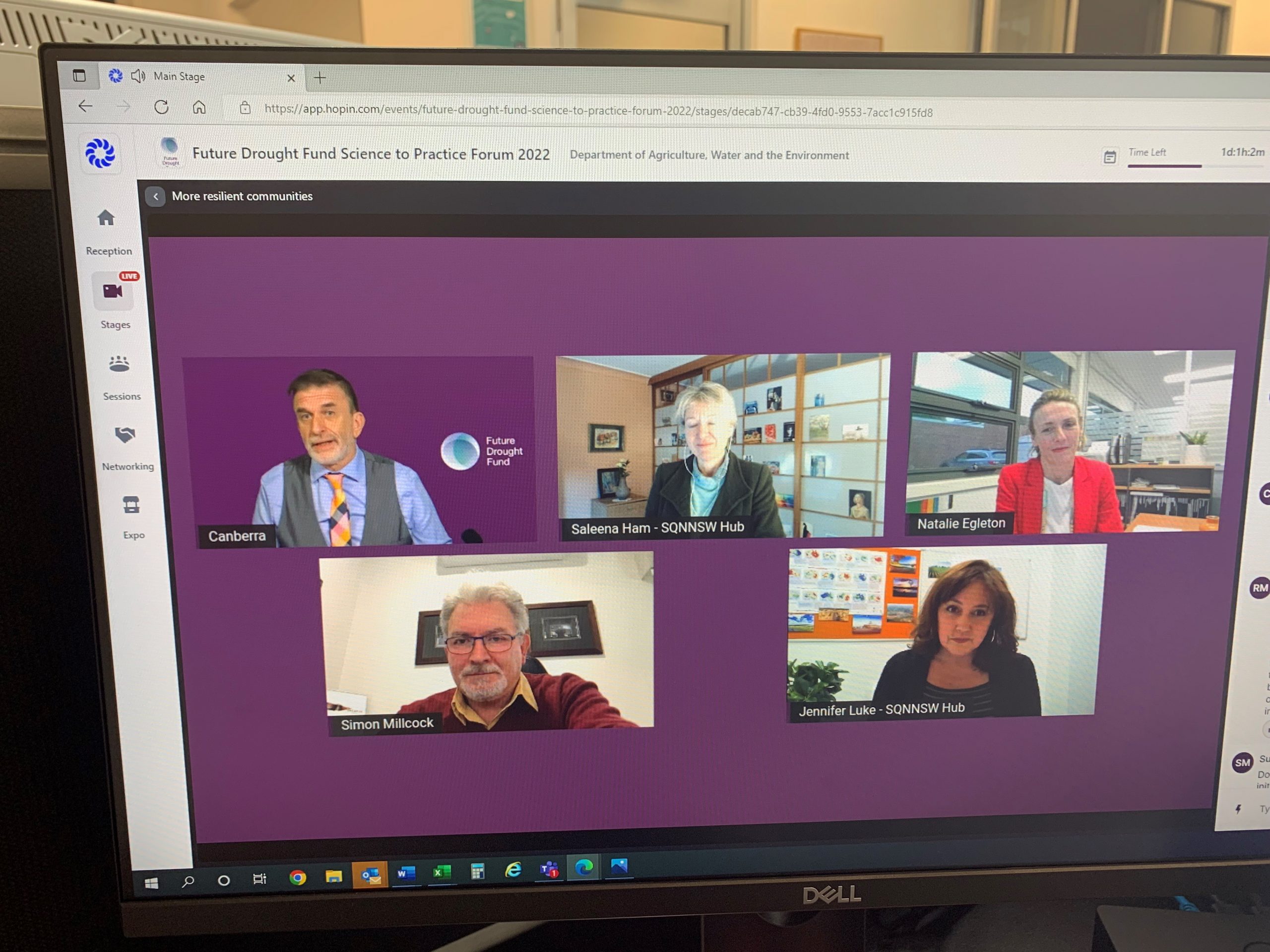Insights & Learning
Reports, Evaluations and Continuous Learning
This reporting year we released two flagship reports which have informed our work and that of others, and have embarked on further program evaluations.
Disaster Resilient: Future Ready
Since 2017, FRRR has worked closely with three NSW communities, in conjunction with Resilience NSW and the University of Sydney, on an applied research project designed to understand what it takes for communities to be better prepared for disasters.
The Get Ready Disaster Resilient: Future Ready (DR:FR) pilot project involved wide community consultation, identification of community-led ideas to address the specific disaster context of each community, funding to implement the ideas, and a formal independent research and evaluation initiative to assess its effectiveness. The summary research report was released in September 2021. Among the many findings was that for disaster resilience efforts to be impactful and meaningful, affected communities need to be actively engaged and involved in the process. The report identified seven key factors that are critically important in community-led resilience: communication networks; self-organising systems; decision-making; information; resources, tools and support; and inclusion.
To delve further into the report, FRRR hosted webinars for community groups and our donor partners. FRRR appreciates the support of the Joint State and Commonwealth Natural Disaster Resilience Program for the action research component of the pilot project. Read the summary report.
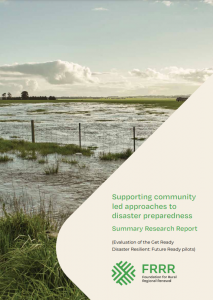
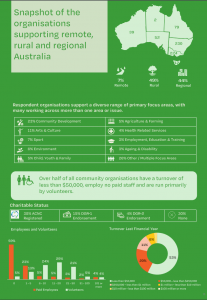
Heartbeat of Rural Australia Study
From working deeply in rural communities over the past 22 years, FRRR is acutely aware of the critical role that small not-for-profit organisations and community groups play in keeping their communities vibrant and resilient.
But not everyone is, which prompted FRRR to commission the Heartbeat of Rural Australia study. It was an opportunity for grassroots community groups to have their say on the cumulative impacts of drought, fires, floods, the mouse plague and the COVID pandemic, and identify what support they need. The report also sought to quantify the important economic, social and cultural role of these groups.
The survey received 638 responses, with broad coverage across regional, rural and remote Australia. The majority (59%) of respondents were from entirely volunteer-led organisations – a group that is often not heard from. FRRR hosted a webinar to walk community groups through the resource, and another tailored to funders, policy-makers and the broader social sector.
Partnering with Seer Data and Analytics, we made the full dataset available online. It can be cross-referenced with other publicly available data, enabling community groups to better advocate for the support that they need to survive.
Our team continues to leverage the study’s insights to understand the landscape of NFPs in remote, rural and regional Australia, drawing on its findings often when presenting, pitching and planning our work. Critically, its findings informed the creation of the Rebuilding Regional Communities stream of the SRC program, which responds to COVID impacts.
Explore the full report or watch the webinar.
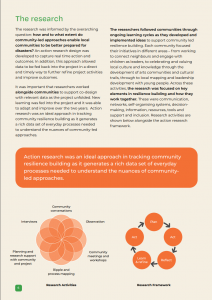
Ongoing FRRR Program Evaluations
FRRR is now just over half-way into a five-year partnership with Vincent Fairfax Family Foundation to strengthen local NFPs in their communities through the Investing in Rural Community Futures (IRCF) program. This initial partnership has subsequently led to other organisations joining us, and more communities participating. Local NFPs work collaboratively to develop a Community Roadmap setting out their goals and priorities, and are supported by a local facilitator, ongoing grants and a toolbox of expert assistance and resources.
The IRCF program is independently evaluated at regular intervals by Matrix on Board. The aim is to both assess the impact of the program at different levels, using organisational self-assessment, community workshops and measurable data from FRRR’s granting, and to validate this place-based approach to NFP sector capacity building in rural and regional communities.
This work has informed the design of other programs, such as the Future Drought Fund’s Helping Regional Communities Prepare for Drought Initiative, which got underway in August 2022, and fed into the refinement of the DR:FR model as it rolls out nationally.
The final evaluation is underway on Tackling Tough Times Together (TTTT), a targeted drought support program established in 2014 with the Tim Fairfax Family Foundation and expanded in 2018 with the Australian Government and many trusts, foundations, corporations and everyday people. TTTT granted out more than $18 million and is currently scaled down, with a small amount of funds available for communities still experiencing drought. The evaluation of this program will conclude in FY23, along with the assessment of the impact of the Future Drought Fund’s Networks to Build Drought Resilience program.
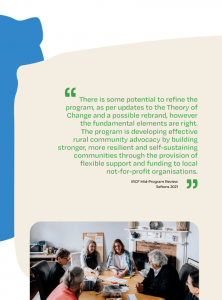
Policy Submissions
FRRR often makes public submissions on issues that affect remote, rural and regional communities. This year, drawing on the insights from the Heartbeat study, we lodged a submission to the 2021 Regional Telecommunications Review, as lack of access to digital and reliable telecommunications facilities was a key issue highlighted in the study.
It is FRRR’s firm belief that access to reliable telecommunications in remote, rural and regional Australia is fundamental for communities to thrive. As an organisation that operates from a regional base and through our daily interactions with these community groups across Australia, the problems that arise from a lack of accessibility and reliability in this area are only too apparent.
We published a response to the recommendations of the Pride of Place: Senate Standing Committee Inquiry into the future of Regional Australia. While broadly supportive, we shared our learnings to reflect the voice of our communities to build on the solution to achieving sustained improvement of remote, rural and regional Australia.
We also noted the Federal Government’s Budget announcement that DGR-1 status will be extended to community foundations. This reform paves the way for much-needed additional local giving, and FRRR will continue to support rural communities across Australia to address local and regional issues. We continue to monitor the next steps on this announcement and will work closely with the 19 Community Foundations that currently hold one of our Community Foundation Fundraising Accounts; we are in a position to take advantage of this legislative reform.

